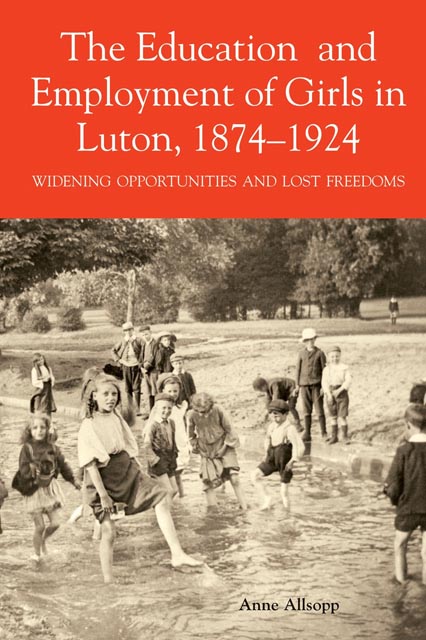Book contents
- Frontmatter
- Contents
- List of Illustrations
- List of Tables
- Dedication
- Acknowledgements
- Abbreviations
- Introduction
- Chapter One Luton: Scientiae et labori detur
- Chapter Two Further Perspectives Concerning Employment Patterns for Women
- Chapter Three Sunday Schools
- Chapter Four Education in the Time of the School Board
- Chapter Five Teaching: An Alternative Occupation
- Chapter Six Teacher Training and the Education of Students Aged Over Fourteen Under Bedfordshire County Council
- Chapter Seven Elementary Education 1903–1924
- Chapter Eight Rural Schools
- Chapter Nine Learning and Living
- Chapter Ten Secondary Education for Girls
- Conclusion
- Appendix
- Bibliography
- Index
Conclusion
Published online by Cambridge University Press: 03 August 2023
- Frontmatter
- Contents
- List of Illustrations
- List of Tables
- Dedication
- Acknowledgements
- Abbreviations
- Introduction
- Chapter One Luton: Scientiae et labori detur
- Chapter Two Further Perspectives Concerning Employment Patterns for Women
- Chapter Three Sunday Schools
- Chapter Four Education in the Time of the School Board
- Chapter Five Teaching: An Alternative Occupation
- Chapter Six Teacher Training and the Education of Students Aged Over Fourteen Under Bedfordshire County Council
- Chapter Seven Elementary Education 1903–1924
- Chapter Eight Rural Schools
- Chapter Nine Learning and Living
- Chapter Ten Secondary Education for Girls
- Conclusion
- Appendix
- Bibliography
- Index
Summary
This book has looked at the changes in education and employment prospects for girls in Luton and has tried to demonstrate how these two aspects of their lives were inter-related.
Increased opportunities
The date chosen for the commencement of this study (1874) was an important one for girls in Luton because it marked both the establishment of the School Board and the introduction of compulsory education. Whereas girls’ time had once been dominated by the demands of the hat industry and their educational prospects had been at the mercy of parents’ ability to pay fees and forgo their children's income, regular attendance at school was now obligatory.
Women in Luton had traditionally received education in less formal organizations and this kind of initiative was still alive, for example private commercial courses were available. Organizations such as the Sunday and adult schools no longer needed to teach basic literacy but continued to receive loyal support in classes which extended interests and stimulated discussions. Lectures given under the auspices of groups such as the Workers’ Education Association (WEA) were also supported by Luton women. Middle-class families who were conscious of their status and who wished to have their daughters educated as young ladies, supported private establishments throughout the years covered in this book.
However, the fee-paying day secondary school which had been set up by Bedfordshire County Council (BCC) was open to all and became increasingly popular. Children whose parents were unable to pay could earn a free place, but there were other financial constraints such as purchasing uniforms and supporting charities. It was therefore inevitable that this school was seen to be for the privileged few. It also seems likely that some kind of selection existed within the girls’ school itself when the emphasis became decidedly academic. However, by 1924 there was, for a small minority, the very real possibility of a university education.
There were also increased opportunities for girls in the employment market. Changes in the hat industry had required local businessmen to welcome other industries into the town, with the result that women had wider choices. Census figures show that, while the hat industry dominated the scene, many women were taking advantage of opportunities to work in local factories and offices. By the 1920s, a Juvenile Advisory Committee had been set up to offer advice to boys and girls who were leaving school. This would hardly have been necessary when one industry dominated women's lives, but times were changing.
- Type
- Chapter
- Information
- The Education and Employment of Girls in Luton, 1874-1924Widening Opportunities and Lost Freedoms, pp. 244 - 248Publisher: Boydell & BrewerFirst published in: 2023



